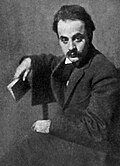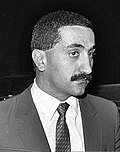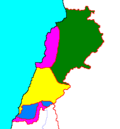Portal:Lebanon
The Lebanon PortalA view of Byblos, Lebanon
 Lebanon, officially the Republic of Lebanon, is a country in the Levant region of West Asia. Situated at the crossroads of the Mediterranean Basin and the Arabian Peninsula, it is bordered by Syria to the north and east, Israel to the south, and the Mediterranean Sea to the west; Cyprus lies a short distance from the coastline. Lebanon has a population of more than five million and an area of 10,452 square kilometres (4,036 sq mi). Beirut is the country's capital and largest city. Human habitation in Lebanon dates to 5000 BC. From 3200 to 539 BC, it was part of Phoenicia, a maritime civilization that spanned the Mediterranean Basin. In 64 BC, the region became part of the Roman Empire and the subsequent Byzantine Empire. After the seventh century, it came under the rule of different Islamic caliphates, including the Rashidun, Umayyad and Abbasid. The 11th century saw the establishment of Christian Crusader states, which fell to the Ayyubids and the Mamluks. Lebanon came under Ottoman rule in the early 15th century. Under Ottoman sultan Abdulmejid I, the first Lebanese proto state, the Mount Lebanon Mutasarrifate, was established as a home for Maronite Christians, as part of the Tanzimat reforms. Lebanon is a developing country, ranked 112th on the Human Development Index. It has been classified as an upper-middle-income state. The Lebanese liquidity crisis, coupled with nationwide corruption and disasters such as the 2020 Beirut explosion, precipitated the collapse of Lebanon's currency and fomented political instability, widespread resource shortages, and high unemployment and poverty. The World Bank has defined Lebanon's economic crisis as one of the world's worst since the 19th century. Despite the country's small size, Lebanese culture is renowned both in the Arab world and globally, powered primarily by the large and influential Lebanese diaspora. Lebanon is a founding member of the United Nations and the Arab League, and a member of the Non-Aligned Movement, the Organization of Islamic Cooperation, the Organisation internationale de la Francophonie, and the Group of 77. (Full article...) This is a Featured article, one of the best articles Wikipedia has to offer.
 Beirut was twice occupied during the Russo-Turkish War of 1768–1774 by squadrons of the Imperial Russian Navy's Mediterranean Fleet, first in June 1772 and second from October 1773 to early 1774, as part of its Levant campaign. Russia's main objective in this campaign was to assist local forces led by Egypt's autonomous ruler, Ali Bey al-Kabir, who was in open rebellion against the Ottoman Empire. Russia, led by Catherine the Great, was pressing the Ottomans in Europe. Ali took advantage of the Empire's preoccupation with Russia to declare Egypt's independence; in 1771 he sent an army led by Muhammad Bey Abu al-Dhahab to occupy Ottoman territory in the Levant. Abu al-Dhahab unexpectedly returned to challenge Ali for control of Egypt. Ali requested Russian military assistance against both his rival and the Ottomans. When this aid, in the form of a small Russian squadron, arrived in the region, Ali had already fled Egypt and taken refuge in Acre, the power base of his ally, Zahir al-Umar. After helping repel an Ottoman offensive on Sidon, the Russian squadron sailed for Beirut. They bombarded the town in June 1772 and occupied it from 23 to 28 June. Ali requested further assistance from Russia to recover Egypt from Abu al-Dhahab. The Russians had recently entered a period of truce with the Ottomans, constraining their involvement in the region. They did, however, promise Ali a large squadron. Impatient, Ali set out for Egypt with a small force that was defeated near Cairo; he was imprisoned and died a few days later. When the Russian squadron arrived in June 1773 and learned of Ali's fate, its commander allied with Zahir and the Druze chieftain Yusuf Shihab. The latter had agreed to pay the Russians a tribute in exchange for their liberation of Beirut from Jazzar Pasha, Shihab's insubordinate vassal whom he had recently appointed as governor of the town. The bombardment of the town began on 2 August, and Jazzar surrendered after two months, on October 10. A few hundred Albanian mercenaries were left as occupiers. (Full article...) Did you know (auto-generated) -
TopicsRelated portalsReligions in Lebanon Arab states Other countries This is a Good article, an article that meets a core set of editorial standards.
Hezbollah (/ˌhɛzbəˈlɑː/ HEZ-bə-LAH; Arabic: حزب الله, romanized: Ḥizbu 'llāh, pronounced [ħizbuˈɫːaːh], lit. 'Party of God') is a Lebanese Shia Islamist political party and paramilitary group. Hezbollah's paramilitary wing is the Jihad Council, and its political wing is the Loyalty to the Resistance Bloc party in the Lebanese Parliament. Its armed strength was assessed to be equivalent to that of a medium-sized army in 2016. Hezbollah was founded in 1982 by Lebanese clerics in response to the Israeli invasion of Lebanon. Inspired by the Iranian Revolution of 1979 and Ayatollah Ruhollah Khomeini's model of Islamic governance, Hezbollah established strong ties with Iran. The group was initially supported by 1,500 Islamic Revolutionary Guard Corps (IRGC) instructors, who helped unify various Lebanese Shia factions under Hezbollah's leadership. Hezbollah's 1985 manifesto outlined its key objectives, which include expelling Western influence from the region, destroying Israel, pledging allegiance to Iran's supreme leader, and establishing an Islamic government influenced by Iran's political ideology. However, the manifesto also emphasized Lebanese self-determination. Throughout the 1980s and 1990s, Hezbollah fought against Israeli forces and the South Lebanon Army (SLA), eventually leading to Israel's withdrawal from southern Lebanon in 2000. Hezbollah also played a prominent role in the 2006 Lebanon War and later became involved in the Syrian civil war, where it fought alongside the Syrian government against rebel forces. In 2009, Hezbollah updated their manifesto to oppose political sectarianism, appeal to non-Islamic movements, and promote a national unity government. The updated manifesto has the same basic approach to foreign policy, emphasizing the hegemonic strategies of the US and Israel's role in the region as a forward base for colonizing the region. (Full article...) General imagesThe following are images from various Lebanon-related articles on Wikipedia.
CategoriesAssociated WikimediaThe following Wikimedia Foundation sister projects provide more on this subject:
SourcesDiscover Wikipedia using portals |























































